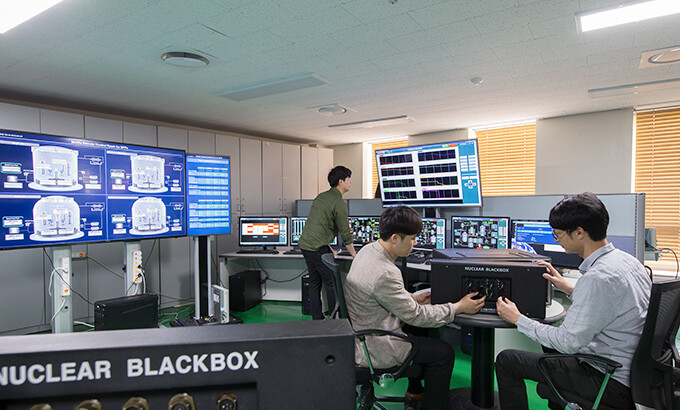
Daejeon, Republic of Korea – The Korea Atomic Energy Research Institute (KAERI, President Joo Han-gyu) announced that a delegation from Taiwan's National Tsing Hua University (NTHU) visited KAERI on June 2 to discuss in-depth ways to strengthen cooperation in nuclear research and development. This visit reflects Taiwan's keen interest in advanced Korean nuclear technology amidst recent rapid changes in Taiwan's nuclear policy environment.
Key Taiwanese Nuclear Academics Inspect Core Korean Nuclear Facilities
The Taiwanese delegation consisted of five members, including Professor Yeh J.G. of NTHU's Department of Engineering and System Science, who also serves as President of the Nuclear Energy Society of Taiwan. They visited KAERI's core research facilities: the multi-purpose research reactor HANARO, the SMART Integral Effect Test Facility (SMART-ITEF), and the KAERI Underground Research Tunnel (KURT) for radioactive waste disposal, directly observing the current state of advanced Korean nuclear technology.
HANARO, Korea's only multi-purpose research reactor, is utilized in various fields such as new material development, medical isotope production, and neutron science research, and is considered a source of pride for Korean nuclear technology. The SMART Integral Effect Test Facility is a key facility for comprehensively verifying the safety of SMART (System-integrated Modular Advanced ReacTor), a Korean small modular reactor (SMR). The KAERI Underground Research Tunnel is an important outpost for the development of permanent disposal technology for high-level radioactive waste. The Taiwanese delegation is reported to have been deeply impressed by Korea's nuclear technological capabilities after thoroughly inspecting these facilities.
Changes in Taiwan's Nuclear Policy and Increased Need for Cooperation with Korea
This visit holds greater significance as it comes amidst rapidly changing nuclear-related circumstances in Taiwan, including the permanent shutdown of Taiwan's last nuclear power plant, Maanshan Unit 2, in May. Taiwan has pursued a nuclear phase-out policy with the goal of becoming a "nuclear-free nation by 2025." However, recent power supply instability and international pressure to achieve carbon neutrality have led to active re-discussion of the necessity of nuclear energy. In fact, the debate surrounding the potential restart of Maanshan Unit 2 has emerged as a major issue in Taiwanese society, reflecting Taiwan's practical dilemma of simultaneously achieving stable energy supply and carbon emission reduction.
In this situation, Korea's advanced nuclear technology can be an attractive alternative for Taiwan. In particular, Korea's globally recognized SMR technology is expected to help Taiwan explore solutions to various problems it may face during its energy transition. Compared to existing large nuclear power plants, SMRs have shorter construction periods and greater flexibility, offering significant potential for stable power supply and use as distributed power sources. Furthermore, high-level radioactive waste management technology has also emerged as a crucial issue to be addressed after the nuclear phase-out, increasing Taiwan's interest in Korea's related research achievements.
Emphasizing the Importance of Nuclear Cooperation for Achieving Carbon Neutrality Goals
KAERI President Joo Han-gyu emphasized the importance of this visit, stating that "the role of nuclear power is essential for achieving carbon neutrality goals." He expressed his expectation that "this visit by the NTHU delegation will serve as an opportunity to strengthen nuclear cooperation between Korea and Taiwan and lead to tangible R&D results."
Korea is expanding the proportion of nuclear power generation to achieve its 2050 carbon neutrality goal, with a particular focus on concentrating national capabilities on SMR technology development. This policy direction aligns with the global trend of various countries aiming to achieve both energy security enhancement and climate change response.
This cooperation discussion goes beyond mere technology exchange, signifying a joint effort to address common energy issues and the climate crisis faced by both countries. Korea is expected to provide practical assistance to Taiwan regarding various challenges it faces related to nuclear technology, such as a lack of nuclear power plant operation experience, high-level radioactive waste management issues, and the need to introduce new nuclear technologies.
The First Step Towards Building a Future-Oriented Cooperative Relationship
The discussions between KAERI and NTHU are expected to be an important step in advancing nuclear cooperation between the two countries. Moving forward, both countries are anticipated to achieve tangible results through researcher exchange, joint R&D projects, and technical information sharing. In particular, as a leading institution in nuclear research in Taiwan, NTHU's cooperation with KAERI can contribute to strengthening Taiwan's nuclear technological capabilities.
This meeting has not only shown the potential for technological cooperation but also for Korea and Taiwan to establish a crucial partnership in energy security and climate change response in the East Asian region. It is hoped that continuous exchanges and cooperation between the two countries will positively impact nuclear technology development not only in Asia but worldwide.
[Copyright (c) Global Economic Times. All Rights Reserved.]






























